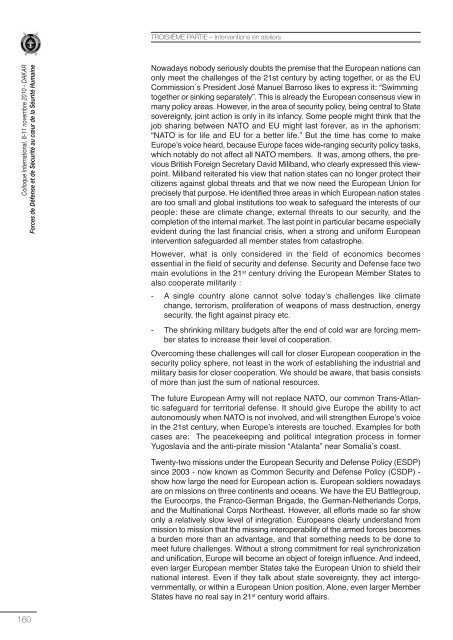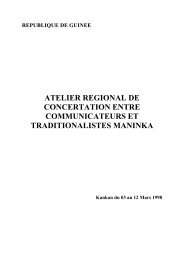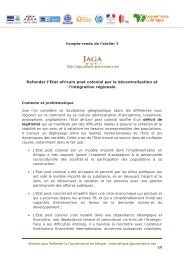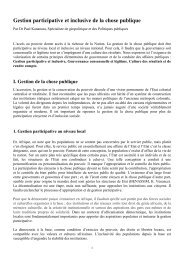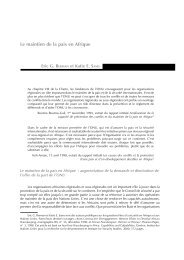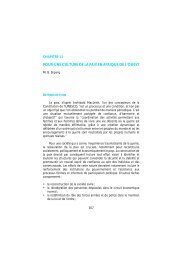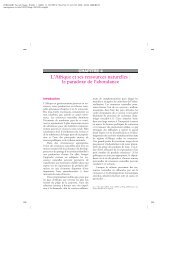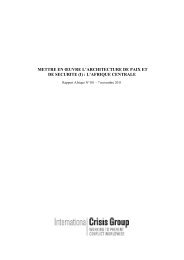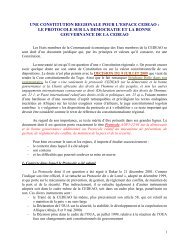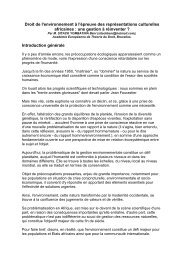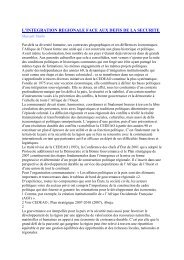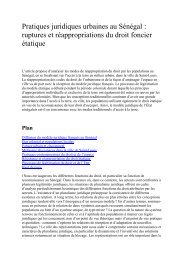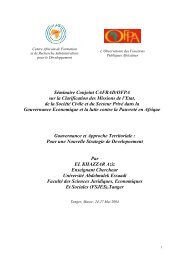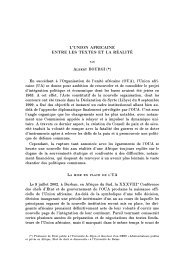Compendium - Fondation Charles Léopold Mayer pour le progrès ...
Compendium - Fondation Charles Léopold Mayer pour le progrès ...
Compendium - Fondation Charles Léopold Mayer pour le progrès ...
You also want an ePaper? Increase the reach of your titles
YUMPU automatically turns print PDFs into web optimized ePapers that Google loves.
TROISIIÈME PARTIE – Interventions en ateliersColloque International, 8-11 novembre 2010 - DAKARForces de Défense et de Sécurité au cœur de la Séurité HumaineNowadays nobody seriously doubts the premise that the European nations canonly meet the chal<strong>le</strong>nges of the 21st century by acting together, or as the EUCommission´s President José Manuel Barroso likes to express it: “Swimmingtogether or sinking separately”. This is already the European consensus view inmany policy areas. However, in the area of security policy, being central to Statesovereignty, joint action is only in its infancy. Some peop<strong>le</strong> might think that thejob sharing between NATO and EU might last forever, as in the aphorism:“NATO is for life and EU for a better life.” But the time has come to makeEuropeʼs voice heard, because Europe faces wide-ranging security policy tasks,which notably do not affect all NATO members. It was, among others, the previousBritish Foreign Secretary David Miliband, who c<strong>le</strong>arly expressed this viewpoint.Miliband reiterated his view that nation states can no longer protect theircitizens against global threats and that we now need the European Union forprecisely that purpose. He identified three areas in which European nation statesare too small and global institutions too weak to safeguard the interests of ourpeop<strong>le</strong>: these are climate change, external threats to our security, and thecomp<strong>le</strong>tion of the internal market. The last point in particular became especiallyevident during the last financial crisis, when a strong and uniform Europeanintervention safeguarded all member states from catastrophe.However, what is only considered in the field of economics becomesessential in the field of security and defense. Security and Defense face twomain evolutions in the 21 st century driving the European Member States toalso cooperate militarily :- A sing<strong>le</strong> country alone cannot solve todayʼs chal<strong>le</strong>nges like climatechange, terrorism, proliferation of weapons of mass destruction, energysecurity, the fight against piracy etc.- The shrinking military budgets after the end of cold war are forcing memberstates to increase their <strong>le</strong>vel of cooperation.Overcoming these chal<strong>le</strong>nges will call for closer European cooperation in thesecurity policy sphere, not <strong>le</strong>ast in the work of establishing the industrial andmilitary basis for closer cooperation. We should be aware, that basis consistsof more than just the sum of national resources.The future European Army will not replace NATO, our common Trans-Atlanticsafeguard for territorial defense. It should give Europe the ability to actautonomously when NATO is not involved, and will strengthen Europeʼs voicein the 21st century, when Europeʼs interests are touched. Examp<strong>le</strong>s for bothcases are: The peacekeeping and political integration process in formerYugoslavia and the anti-pirate mission “Atalanta” near Somaliaʼs coast.Twenty-two missions under the European Security and Defense Policy (ESDP)since 2003 - now known as Common Security and Defense Policy (CSDP) -show how large the need for European action is. European soldiers nowadaysare on missions on three continents and oceans. We have the EU Batt<strong>le</strong>group,the Eurocorps, the Franco-German Brigade, the German-Netherlands Corps,and the Multinational Corps Northeast. However, all efforts made so far showonly a relatively slow <strong>le</strong>vel of integration. Europeans c<strong>le</strong>arly understand frommission to mission that the missing interoperability of the armed forces becomesa burden more than an advantage, and that something needs to be done tomeet future chal<strong>le</strong>nges. Without a strong commitment for real synchronizationand unification, Europe will become an object of foreign influence. And indeed,even larger European member States take the European Union to shield theirnational interest. Even if they talk about state sovereignty, they act intergovernmentally,or within a European Union position. Alone, even larger MemberStates have no real say in 21 st century world affairs.160


